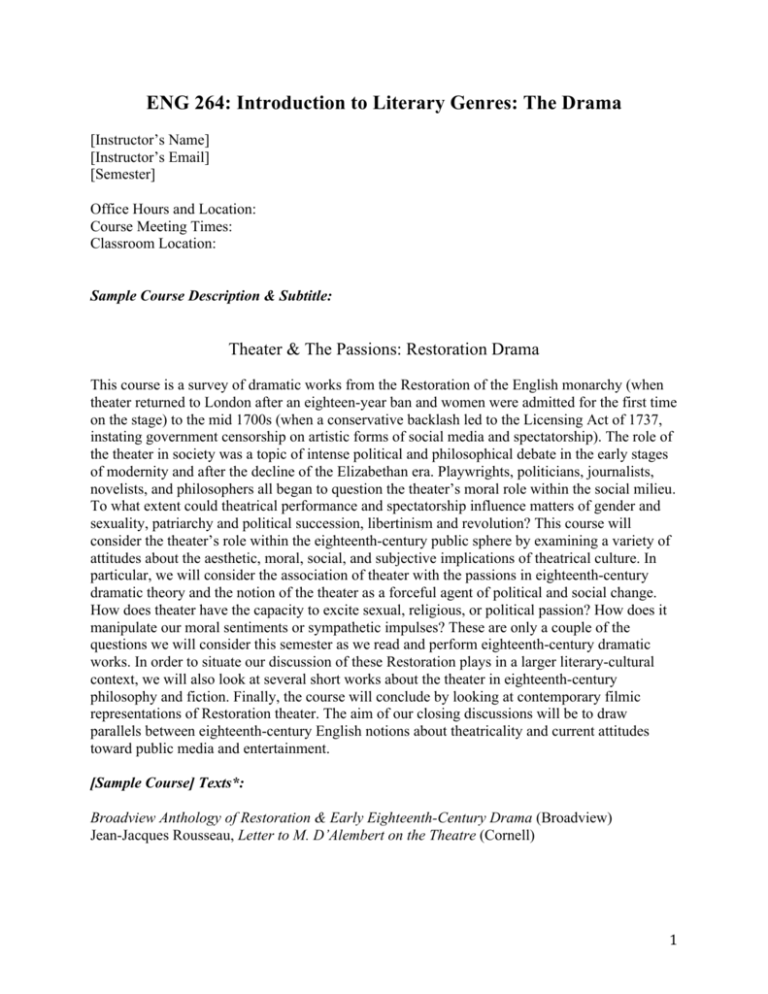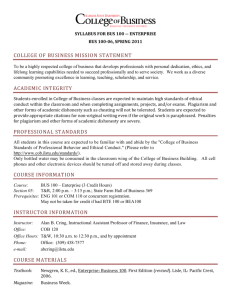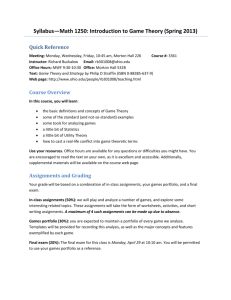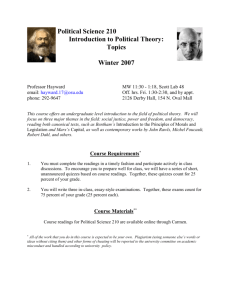ENG 264 syllabus
advertisement

ENG 264: Introduction to Literary Genres: The Drama [Instructor’s Name] [Instructor’s Email] [Semester] Office Hours and Location: Course Meeting Times: Classroom Location: Sample Course Description & Subtitle: Theater & The Passions: Restoration Drama This course is a survey of dramatic works from the Restoration of the English monarchy (when theater returned to London after an eighteen-year ban and women were admitted for the first time on the stage) to the mid 1700s (when a conservative backlash led to the Licensing Act of 1737, instating government censorship on artistic forms of social media and spectatorship). The role of the theater in society was a topic of intense political and philosophical debate in the early stages of modernity and after the decline of the Elizabethan era. Playwrights, politicians, journalists, novelists, and philosophers all began to question the theater’s moral role within the social milieu. To what extent could theatrical performance and spectatorship influence matters of gender and sexuality, patriarchy and political succession, libertinism and revolution? This course will consider the theater’s role within the eighteenth-century public sphere by examining a variety of attitudes about the aesthetic, moral, social, and subjective implications of theatrical culture. In particular, we will consider the association of theater with the passions in eighteenth-century dramatic theory and the notion of the theater as a forceful agent of political and social change. How does theater have the capacity to excite sexual, religious, or political passion? How does it manipulate our moral sentiments or sympathetic impulses? These are only a couple of the questions we will consider this semester as we read and perform eighteenth-century dramatic works. In order to situate our discussion of these Restoration plays in a larger literary-cultural context, we will also look at several short works about the theater in eighteenth-century philosophy and fiction. Finally, the course will conclude by looking at contemporary filmic representations of Restoration theater. The aim of our closing discussions will be to draw parallels between eighteenth-century English notions about theatricality and current attitudes toward public media and entertainment. [Sample Course] Texts*: Broadview Anthology of Restoration & Early Eighteenth-Century Drama (Broadview) Jean-Jacques Rousseau, Letter to M. D’Alembert on the Theatre (Cornell) 1 *NOTE: The above texts are available in the bookstore. If you plan to order texts online, please see the Sakai handout on textbook order information. Texts not included in the above list will be distributed as PDFs and posted under the resources folder of Sakai. . Course Schedule NOTE: Assignments will be due and readings discussed on the day they appear in the schedule! The schedule may be subject to change, depending upon the pace of discussions and the progress of your written work. Students will be notified of any relevant changes. Wednesday, January 21: Introduction to Course Syllabus; Henry Fielding, Excerpt from Tom Jones Monday, January 26: Aphra Behn, The Rover Wednesday, January 28: The Rover Monday, February 2: George Etherege, The Man of Mode; Selections from The Spectator Papers on theatrical types, and issues of gender and sexuality. Wednesday, February 4: Etherege, The Man of Mode Monday, February 9: Denis Diderot, The Paradox of Acting (PDF); Jane Austen, Excerpt from Mansfield Park (PDF) Wednesday, February 11: Eliza Haywood, Fantomina (PDF) Monday, February 16: NO CLASS: PRESIDENTS’ DAY Wednesday, February 18: Writing Class Monday, February 23: William Wycherly, The Country Wife [In-Class Performance] *Cast Lists to be announced via Sakai prior to each day of the performance. Extra credit for costumes. Watch the film clips posted on Sakai as a resource for Restoration styles of performance. Wednesday, February 25: Wycherly, The Country Wife [In-Class Performance] Monday, March 2: Wycherly, The Country Wife [In-Class Performance] Wednesday, March 4: William Congreve, The Way of the World DUE: Essay #1 (2-3 pp). Monday, March 9: Congreve, The Way of the World Wednesday, March 11: Film: The Libertine DUE: Film Response #1 (2 pp) SPRING BREAK 2 Monday, March 23: Jean-Jacques Rousseau, Letter to M. D’Alembert DUE: Review of Class Performance of The Country Wife, written in the style of Richard Steel (see assignment instructions below) Wednesday, March 25: Rousseau, Letter to M. D’Alembert Monday, March 30: Richard Steele, The Conscious Lovers Wednesday, April 1: Steele, The Conscious Lovers DUE: Essay #2 (2-3 pp.) Monday, April 6: George Lillo, The London Merchant Wednesday, April 8: Lillo, The London Merchant Monday, April 13: Film: Stage Beauty DUE: Film Response #2 (2 pp.) Wednesday, April 15: John Gay, The Beggar’s Opera *Watch and listen to clips from ballad opera music, available on Sakai Monday, April 20: Gay, The Beggar’s Opera Wednesday, April 22: Richard Sheridan, School for Scandal Monday, April 27: Sheridan, School for Scandal Wednesday, April 29: Final Discussion & Concluding Remarks. DUE: Essay #3/Final Paper (5 pp). Objectives and Outcomes: 1. Identify and define the major performance techniques of Restoration drama and eighteenthcentury sympathetic tragedy. 2. Identify and deploy basic concepts of theater and performance (including staging, gesture, costume, and facial expression) and consider the cultural and philosophical discourses that undergird diverse historical performance styles and playwriting techniques. 3. Use appropriate terminology for performance and playwriting and place these terms in a cultural-philosophical context in your analytical, creative, and critical writing. 4. Develop the skills of close reading. These include: diction analysis, analysis of literary tropes, satiric devices, sentence structure, narrative style, voice, and tone. 5. Understand and deploy major social and cultural constructs relevant to the Restoration period and its eighteenth-century theatrical successors: these include historical concepts of gender, sexuality, class, and race, as well as cultural concepts of country and city life, globalization, economic trends, philosophical contexts, and national identity. 6. Appreciate and deploy the different approaches that early playwrights and philosophers use to enact social commentary. Appreciate their engagement with their own respective socioeconomic, philosophic, and cultural-historical milieus. Consider how these literary historical 3 works inform and compare with our world today (especially as regards issues of media, publicity, performance, and the public and private spheres of cultural life.) General Education. This course provides general education credit for the following outcomes: 7. Humanities. 8. Writing Essays: All essays must meet the length requirement, or they will not be accepted. All papers must be formatted as follows: • word-processed and submitted in hard copy • stapled or otherwise securely fastened • double-spaced • submitted in Times New Roman, 12-point, black font, with 1” margins on all sides • formatted with your name, course number, assignment number, date, and essay title Should you require an extension for a paper, it is expected that you will submit your request at least four days prior to the date on which the paper is due. Attendance and Participation: Students are expected to attend every class. Attendance in class is crucial, and five or more unexcused absences from class will automatically result in a mark of failure for the term. Four unexcused absences will negatively affect your overall semester grade. Excused absences require a note from a doctor, academic advisor, government official, or athletic coach. Religious absences are the only excused absences that do not require a note; in this case only, an email notifying me of your religious observance will suffice. Academic Integrity: All written work for the class is expected to be the student’s own. Plagiarism is obviously unacceptable! Students are required to familiarize themselves with URI’s online code of “Academic Honesty & Integrity.” This web page can be found at: http://www.cba.uri.edu/AcademicHonestyandIntegrity/. If there are any questions concerning the university’s policies on academic integrity, please come see me for further clarifications. In this class, you will learn how to practice close readings of the texts assigned. There will be NO research papers assigned for this course. Therefore, I ask that you do not do any outside research or incorporate secondary source reading into your essays without my specific permission. Please note that in this course the penalty for violating URI’s code of Academic 4 Honesty and Integrity will most likely result in a mark of failure for the term. Resources: Please make ample use of my office hours and the writing center when working on your essays! Office hour appointments should be made via email in advance; that way we will be sure to have plenty of time for your essay preparation and needs. You can make appointments at the writing center by calling: (401) 874 4690. Please show up prepared for all appointments. The writing center has tips on this: http://www.uri.edu/artsci/writing/center/index.shtml. For office hours, I ask that you show up with your text, or passage(s), in hand and a thesis paragraph if necessary. Disabilities Statement: In compliance with the URI policy and equal access laws, I am available to discuss appropriate academic accommodations that may be required for students with disabilities. Requests for these accommodations are to be made during the first week of the semester. You will need to follow up on your request for accommodation with an official letter from Disability Services. If you have a documented disability, please be sure to contact Disability Services in order to ensure your success in our college environment: Disability Services for Students, Office of Student Life, 330 Memorial Union, 874-2098. Assignments and In-Class Participation: This class will require your active participation and a close attention to textual detail. Although there will be a lecture component to this course, most of our class time will involve a seminarstyle approach to close reading and analysis—as well as the employment of eighteenth-century theatrical performance techniques. In other words, you should expect to participate in all classroom discussions. You may be asked to perform from the assigned texts or read passages aloud. (If you are uncomfortable with the performative elements of the class, please contact me via email.) Please note that this is a reading intensive course! You are expected to keep up with the assigned readings and to arrive to class ON TIME and prepared to participate in discussion. This also means that you must come to class with your text in hand! You can expect occasional homework assignments designed to facilitate in-class discussion. Such assignments are designed to prepare you for your essay projects and may include: the OED assignment (a brief research assignment for analyzing historical etymology and diction), drafts of thesis paragraphs (followed by a 15-minute in-class workshop), and several “passage selection” assignments. Passage selection assignments ask you to type out a selected passage from the text we are reading and pose three questions (for in-class discussion) related to the form, diction, and structure of the passage. In addition, to your formal essay assignments and informal homework assignments explained above, you will be asked to write two film response papers that analyze and evaluate filmic attempts to represent the eighteenth-century life of the theater. There will be prompts for these response papers that ask you to address related course concepts when reviewing the films. 5 We will perform sections from all plays aloud (with staging techniques as the semester progresses). Our reading of The Country Wife will entail a full performance of the play according to Restoration conventions of acting, staging, theatrical dress, gesture, and performance. I will direct throughout and prepare you for this in-class assignment in advance. You will be asked to do one creative writing assignment for this class. For this assignment, you will read a review by Richard Steele (whose name you'll recognize as not only the author of The Conscious Lovers but also one of the main writers and editors for the eighteenth-century periodical, The Spectator Papers). This is a 1711 review of a production of George Etherge's The Man of Mode in London. Note the style of the review—how it focuses less on the direction, or artistic aspects, of the play's staging and performance but more on its moral contents. This is not the kind of review one might encounter in the Arts section of today’s New York Times!—or even in less formal venues for film criticism such as Rotten Tomatoes. Your assignment is to write a 2-5 page “review” of our own in-class performance of The Country Wife; this should be written in the style of Steele’s famous review, taking a philosophical and moral approach to the content as well as the production of Wycherly’s play. All assignments will be explained in detail prior to their due date. Although this class will not require you to use sources outside of the primary texts assigned, you should familiarize yourself with the Oxford English Dictionary and use this as a constant resource when reading. The OED is available online to all students through the URI library interface. Finally, please note that no technological devices are allowed in the classroom once class begins. Please turn off all laptops, cell phones, and other personal devices at the start of class. Course Grades: Class Participation 15% (includes attendance, discussion, and short assignments) Essays & Final Exam 85% Note: You are required to write a total of three papers for this course. All papers are weighted equally despite their length requirements. At the end of the term, I will calculate your final grade by averaging your three paper grades. I will then account for your short assignments (film reviews and creative writing assignments) and in-class participation. Papers that are not handed in or that are handed in more than one week late without my permission for an extension will automatically receive a mark of “F.” You are responsible for completing and handing in all assignments in a timely fashion. 6







